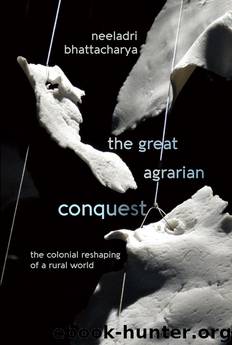The Great Agrarian Conquest by Neeladri Bhattacharya;

Author:Neeladri Bhattacharya;
Language: eng
Format: epub
Publisher: State University of New York Press
Published: 2019-03-13T16:00:00+00:00
7
Beyond the Code
OVER THE COLONIAL YEARS a specific form of agrarian regime was consolidated over the countryside. Pastoralists were settled, vast stretches of forests and “wastes” colonised, and the limits of cultivation pushed outwards. The codification of customs, the categorisation of tenures, the legal definition of rights, and the juridical reclassification of agrarian groups created the framework within which an agrarian regime took shape. In the countryside we see a gradual consolidation of patriarchal brotherhoods, a process that signified the displacement of women, “lower” castes, and “outsiders” – those who did not belong to the brotherhood. But the trend line flattens and smoothens the violence of short-term fluctuations, the longue durée – to reverse the Braudelian formulation – blinds us to the drama of everyday events, the secular process hides the upheavals of quotidian life. Despite the pressures of the sedentary state and the expansive thrust of the agrarian regime, pastoralists continued to operate, devising new strategies of survival, rethinking their practices, and forcing the state to reformulate its policies. Similarly, women, “lower” castes, and merchant-moneylenders saw their rights erode as the new juridical regime was established and as the village brotherhood forged and strengthened its internal ties. But they too devised strategies of survival, resisted the displacing power of new laws, and created structures within which they could live or operate. Beneath the formal rules we discover informal practices, behind the public affirmation of laws we hear the secret language of subversion, against the new rights we see the assertion of what was seen as riwaj. Alongside the certitudes of publicly proclaimed law we can uncover the ambiguities in their interpretation and the uncertainties in their implementation. The fixity of what is considered fixed itself comes under question.
In this chapter (as mentioned in the Introduction) I shift from models to strategies, from codes to practices, from discourses of power to the activities of everyday life. I look more closely at the working of the code on the ground – the everyday practices which were both shaped by and which reshaped the regime of rules, codes, laws, and categories. It was through everyday conflicts that the specificity of legal rights was defined and redefined, their meanings clarified and understood; the lived reality was what helped determine which new ideas became part of common sense, how a new habitus gradually came into being.
The habitus, Bourdieu has suggested, is a world that structures common sense, defining what is normal and natural, a world premised on ideals that are not always articulated precisely because they are taken for granted.1 But this habitus, I wish to emphasise, is not so much a settled state of existence or a fixity but a process – and this process is one where what is to be taken for granted is itself under question, where the premises underlying what is considered normal are open to debate. The conflicts around rights and customs that we are exploring in this chapter were all part of such a process which constituted the new sense of normality in the colonial peasant world.
Download
This site does not store any files on its server. We only index and link to content provided by other sites. Please contact the content providers to delete copyright contents if any and email us, we'll remove relevant links or contents immediately.
| Arms Control | Diplomacy |
| Security | Trades & Tariffs |
| Treaties | African |
| Asian | Australian & Oceanian |
| Canadian | Caribbean & Latin American |
| European | Middle Eastern |
| Russian & Former Soviet Union |
The Secret History by Donna Tartt(18157)
The Social Justice Warrior Handbook by Lisa De Pasquale(11951)
Thirteen Reasons Why by Jay Asher(8451)
This Is How You Lose Her by Junot Diaz(6434)
Weapons of Math Destruction by Cathy O'Neil(5829)
Zero to One by Peter Thiel(5488)
Beartown by Fredrik Backman(5351)
The Myth of the Strong Leader by Archie Brown(5237)
The Fire Next Time by James Baldwin(5016)
How Democracies Die by Steven Levitsky & Daniel Ziblatt(4952)
Promise Me, Dad by Joe Biden(4908)
Stone's Rules by Roger Stone(4857)
100 Deadly Skills by Clint Emerson(4689)
A Higher Loyalty: Truth, Lies, and Leadership by James Comey(4550)
Rise and Kill First by Ronen Bergman(4544)
Secrecy World by Jake Bernstein(4388)
The David Icke Guide to the Global Conspiracy (and how to end it) by David Icke(4379)
The Farm by Tom Rob Smith(4323)
The Doomsday Machine by Daniel Ellsberg(4245)
